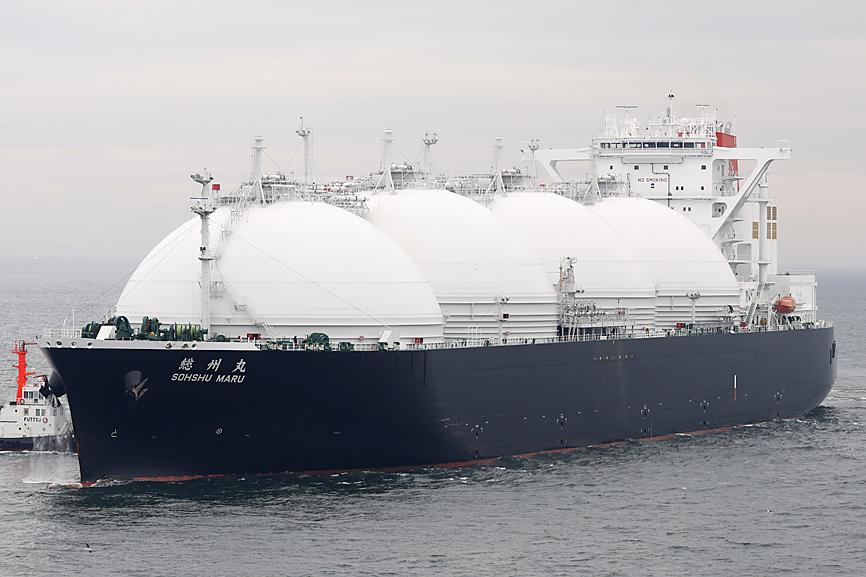Taiwan’s liquefied natural gas (LNG) supply is about 71 percent covered by mid to long-term contracts, mainly with Australia and Qatar, as well as 12 other countries, the Ministry of Economic Affairs said in a report to the legislature yesterday.
Although Taiwan’s trade with Ukraine and Russia is not significant, Russia is the third-largest supplier of LNG to Taiwan, accounting for 9.7 percent of supply, the ministry said.
The nation’s LNG contract with Russia is set to expire this month, the ministry said, adding that it has already identified alternative supply sources such as the US.

Photo: Bloomberg
Taiwan currently has an LNG safety stock of 10.2 days’ supply, the ministry said.
The ministry said it would closely monitor market dynamics and hold discussions with industry players to ensure that domestic production is not affected by unstable commodity prices in the global supply chain, as the war in Ukraine seems likely to continue.
At a meeting of the legislature’s Economics Committee, Lee Shun-chin (李順欽), president and acting chairman of state-run fuel supplier CPC Corp, Taiwan (CPC, 台灣中油), said that if crude oil prices climb to US$150 per barrel, as predicted, the company would face losses of about NT$500 billion (US$17.53 billion).
Oil prices are likely to reach US$150 to US$200 per barrel later this year, as Russia’s invasion of Ukraine continues to affect international commodity markets, several foreign institutions have forecast.
CPC refines about 140 million barrels of oil per year, with 80 percent of the costs managed through the government’s price stabilization mechanism, while the firm absorbs the remaining 20 percent, Lee said.
For every US$1 increase per barrel in international oil prices, CPC would have to spend US$140 million on refining, he said.
Separately, the ministry said that the price of liquefied petroleum gas (LPG) sold in cylinders for domestic use would increase before the end of next month.
While prices of commodities in Taiwan have risen recently, the government would not permit any increase in the price of domestic bottled gas, at least for the next six weeks, in an effort to ease the financial burden on households, the ministry said.
The average retail price of a 20kg cylinder of LPG was NT$654 as of last month, the Bureau of Energy said.

JITTERS: Nexperia has a 20 percent market share for chips powering simpler features such as window controls, and changing supply chains could take years European carmakers are looking into ways to scratch components made with parts from China, spooked by deepening geopolitical spats playing out through chipmaker Nexperia BV and Beijing’s export controls on rare earths. To protect operations from trade ructions, several automakers are pushing major suppliers to find permanent alternatives to Chinese semiconductors, people familiar with the matter said. The industry is considering broader changes to its supply chain to adapt to shifting geopolitics, Europe’s main suppliers lobby CLEPA head Matthias Zink said. “We had some indications already — questions like: ‘How can you supply me without this dependency on China?’” Zink, who also

Taiwan Semiconductor Manufacturing Co (TSMC, 台積電) received about NT$147 billion (US$4.71 billion) in subsidies from the US, Japanese, German and Chinese governments over the past two years for its global expansion. Financial data compiled by the world’s largest contract chipmaker showed the company secured NT$4.77 billion in subsidies from the governments in the third quarter, bringing the total for the first three quarters of the year to about NT$71.9 billion. Along with the NT$75.16 billion in financial aid TSMC received last year, the chipmaker obtained NT$147 billion in subsidies in almost two years, the data showed. The subsidies received by its subsidiaries —

At least US$50 million for the freedom of an Emirati sheikh: That is the king’s ransom paid two weeks ago to militants linked to al-Qaeda who are pushing to topple the Malian government and impose Islamic law. Alongside a crippling fuel blockade, the Group for the Support of Islam and Muslims (JNIM) has made kidnapping wealthy foreigners for a ransom a pillar of its strategy of “economic jihad.” Its goal: Oust the junta, which has struggled to contain Mali’s decade-long insurgency since taking power following back-to-back coups in 2020 and 2021, by scaring away investors and paralyzing the west African country’s economy.

RE100 INITIATIVE: Exporters need sufficient supplies of renewable energy to meet their global commitments and remain competitive, the economics ministry said Local export-oriented manufacturers, including Taiwan Semiconductor Manufacturing Co (台積電), require sufficient supplies of green energy to maintain their competitiveness and regulations already ensure that renewable energy development adheres to environmental protection principles, the Ministry of Economic Affairs said yesterday, as the legislature imposed further restrictions on solar panel installations. The opposition-led Legislative Yuan yesterday passed third readings to proposed amendments to three acts — the Environmental Impact Assessment Act (環境影響評估法), the Act for the Development of Tourism (發展觀光條例) and the Geology Act (地質法) — which would largely prohibit the construction of solar panels in some areas. The amendments stipulate that ground-mounted solar